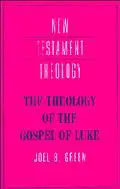

The Theology of the Gospel of Luke
in New Testament Theology (Cambridge)
Pages
184
Publisher
Cambridge University Press
Published
5/26/1995
ISBN-13
9780521469326
The Gospel of Luke, often mined for information about the life of Jesus, is also one of the earliest Christian examples of narrative theology. Luke goes to great lengths to ground the work of Jesus in the continuing story of God's redemptive plan, and his emphasis on the ongoing character of that story challenges his audience to discern the purpose of God and order their lives around it. This exploration of the way in which he accomplishes his theological task in the first century is both informative and illuminating for contemporary readers.
Reviews
Cambridge: Cambridge University Press, 1995. Pp. xiv + 170, Cloth, $44.95/$12.95 (paper), ISBN 0521469325. Mark Allan Powell Trinity Lutheran Seminary Columbus, OH 43209 In this volume, Joel Green offers a concise but remarkably thorough description of the theological witness of Luke's Gospel. Green is Associate Professor of New Testament at the American Baptist Seminary of the West and Graduate Theological Union in Berkeley. He is the author of forthcoming commentaries on both the Gospel of Luke (NICNT, Eerdmans) and the book of Acts (WBC, Word). This volume is part of a series that is explicitly intended for the classroom, to offer "texts around which courses can be developed" (p. iv), and Green makes clear that his interest is specifically an articulation of Lukan theology "for the church" (p. xi). Green does not attempt to resolve questions concerning authorship or date, and he proceeds with scant reference to source theories. He views the third Gospel as a literary whole and endeavors to read it "on its own terms, albeit against the backdrop of what we otherwise know about the first-century world it purports to portray" (p. 6). Socio-anthropological studies become a primary tool for analysis as he seeks to relate the literary world of Luke's narrative to the political and social world in which it was produced. The focus of the study is clearly on Luke's first volume, though Green recognizes an essential narrative and theological unity between the Gospel and Acts. Green's understanding of Luke's theology is laid out in chapters 2-5. Luke's Gospel relates the life and work of Jesus to a larger notion of "the purpose of God," which is articulated in Scripture and has been affirmed through miracles, angels, and the Holy Spirit. Without giving way to strict determinism, Luke is certain that God's aim will be accomplished in spite of opposition. In essence, the divine purpose is "to bring salvation in all its fullness to all persons" (p. 24). As the Son of God, Jesus stands in a unique relationship to God. His ministry and ultimate exaltation serve to advance God's purpose.
[Full Review]
